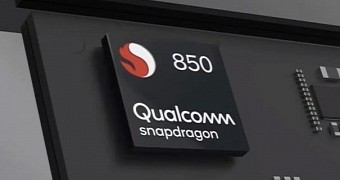Qualcomm has just announced the Snapdragon 850, a new processor that will be used exclusively on devices powered by Windows 10 ARM.
Also called Always Connected PCs, these devices hit the market last year with a custom version of the Snapdragon 835, the chip that was originally installed on high-end phones like the Samsung Galaxy S8.
This year, however, Qualcomm decided to differentiate the processors that it uses on phones from the ones built for Always Connected PCs, despite the new Snapdragon 850 actually being based on the 845 model released for flagship Android phones.
Qualcomm says the Snapdragon 850 has received several optimizations to prepare it for PC use, and performance has been improved by as much as 30 percent. Furthermore, the chip should offer 20 percent better battery life coupled with 20 percent faster peak gigabit data. All these figures are provided in comparison with the Snapdragon 835 processor that was used on the first-generation Always Connected PCs.
New PCs launching later this year
The first models powered by the new processor will hit the market later this year, Qualcomm said in an announcement today, and several companies are likely to launch devices with such hardware, including HP, Lenovo, and even Samsung.
Qualcomm says it has focused on both the hardware and the software departments of this new chip to make it appropriate for PCs, explaining that although based on 845 processor, performance would be dramatically improved.
The rather limited performance of the first-generation Always Connected PCs was considered one of the main drawbacks, with sales remaining significantly below expectations. Microsoft, however, has worked together with Qualcomm to address all these complaints, though it remains to be seen how the new models perform in real life.
For Microsoft, the Windows 10 ARM push is playing a critical role, as it allows the company to target customers that would otherwise head towards the iPad Pro and Chromebooks. These devices, which are available at lower prices than Microsoft’s Surface, are particularly successful in the education market, where the software giant itself relies more on partners than on its own product portfolio.

 14 DAY TRIAL //
14 DAY TRIAL // 